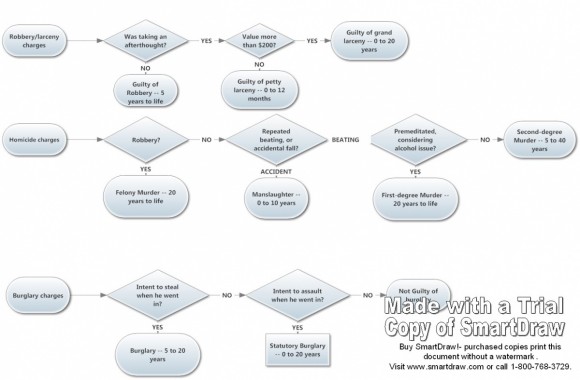I spent a little quality time with a trial version of some flowcharting software, trying to see if I could draw on my computer programming experience to find a way to graphically show the decision-making process that I think the jury in the George Huguely case should follow. Here is the result of that effort, with apologies for my inability to quickly decipher the finetuning aspects of the program. And because I haven’t paid my money, I don’t get the flowchart without the watermark. (I don’t have enough need of the software to make it worth the $197.)
There are three separate decisions that the jury needs to make. The robbery/no robbery decision is the first part of the murder/manslaughter decision, and they should confront that off the top. It comes down to one question — did he intend to take the computer at the time that he was fighting with Yeardley Love? If so, the jury could find a robbery. If the jury has a doubt about that, and think it might have been an afterthought, the jury should NOT find a robbery. If they find no robbery, they would still have to decide the value of the computer, to decide if it was grand larceny or petty larceny. And let me address one technicality here — it is possible to be found guilty of both robbery and grand larceny; it is not possible to be found guilty of both robbery and petty larceny, because petty larceny is a lesser-included offense of robbery while grand larceny is not. But as a practical matter, if the jury found him guilty of both the robbery and the grand larceny, the judge would almost surely run any jail time for the larceny concurrently with the time for the robbery.
And while I am giving disclaimers, this represents only a purist’s theoretical model. The reality is that the jury will end up following a lot of rabbits down a lot of holes, and the real-time decision-making process will be much messier.
I hope this makes the decision tree analysis clearer.


